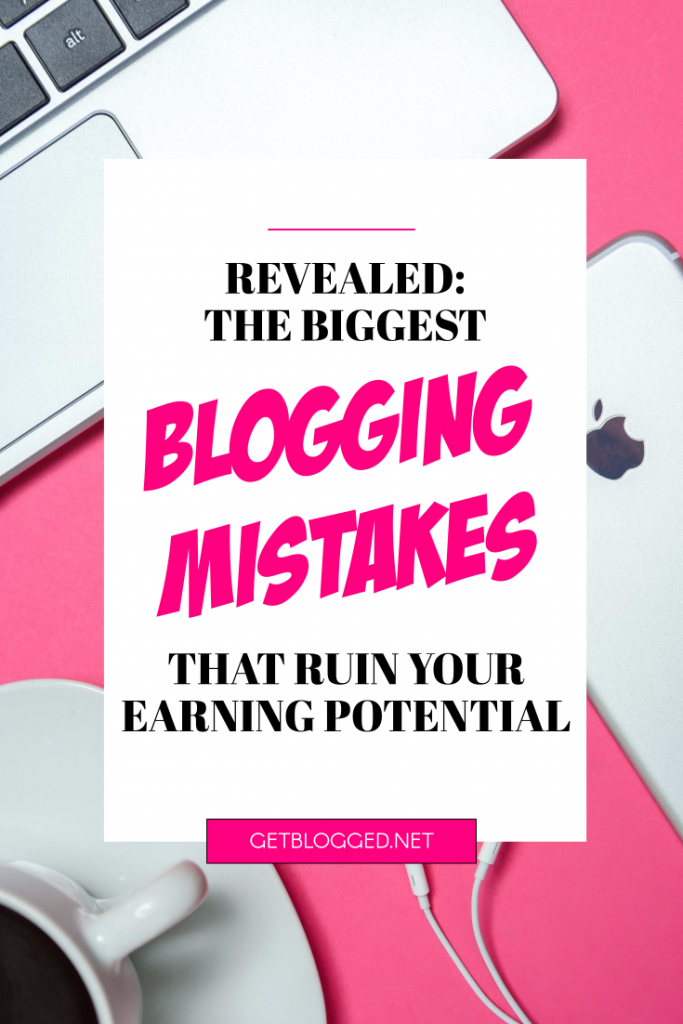Are you slogging away, consistently putting bucketloads of time and energy into your blog, but always find that you’re never quite hitting your big income goals?
Here’s the truth:
In 2020, it is absolutely possible to build a highly profitable blog.
Whether you want to earn a few hundred pounds a month to supplement an existing income, or you dream of ditching the 9-5 completely and making a generous income from your kitchen table, there are countless examples right across the content creator world of people who’ve achieved exactly that.
But what happens when you already have a thorough understanding of monetisation strategies and you’re putting in the work, but things aren’t quite clicking into place the way you want them to be?
If that’s where you are right now, it could be the case that you’re making some of the blogging mistakes that could seriously harm your earning potential.
Let’s take a look at what these are, and how you can get your website on the right track to making the money that you really desire…
1. Secretly believing that you might have left it too late
You’ve no doubt, at one point or another, witnessed conversations going on online that argue that no one reads blog anymore. People will often claim that the heyday of blogging is over, and that it’s simply too late to start building a profitable blog from scratch in 2020.
This is quite simply untrue. Let’s consider the fact that Google receives over 63,000 searches per second on any given day. These searchers are actively looking for information (or sometimes for entertainment), and that information that they seek is delivered in the form of websites. A blog, at the end of the day, is a website.
Whilst social media continues to grow and become a bigger part of our daily lives, it’s often a much more passive activity. It’s what you do when you’re looking for distraction or a way to pass half an hour. When people are actively looking for content and information, they head to Google, and this is unlikely to change for a long time to come.
So would you have had things easier if you’d started your blog ten years ago? Maybe. But there are still limitless opportunities today to grow a blog into a thriving business that supports your dreams and goals. Of course there’ll be hard work along the way, but recognising and believing that it really is possible is half the battle, and gives you the mindset you need to succeed.
2. Focusing on ‘busy work’ instead of money generating activities
At any given time, there’s likely to be a hundred fiddly little tasks that you need to get round to at one point or another. Maybe you want to tweak the colour scheme of your site, or try out a different font, or give your logo a refresh.
These are all things that may well deserve your attention, but take a step back and ask yourself whether you’re prioritising the tasks that are actually going to move the needle and play a key part in the overall growth and profitability of your blog.
If you want to increase your blogging income, make sure that cash generating activities have a place on your agenda every week. In practical terms, these could include:
- Pitching for relevant paid brand collaboration opportunities
- Creating top quality content around your key affiliate partnerships
- Optimising your displays adverts to increase your earnings
- Reaching out to PRs you’ve worked with in the past and sharing your updated media kit or ideas for future campaigns
- Tweaking your top posts with monetisation in mind – for example, is there opportunity to promote an affiliate?
When you strategically take the time on a regular basis to focus on money generating activities, you can get to the bottom of exactly what’s working and what perhaps isn’t, and alter your plans accordingly.
3. Neglecting SEO because you think it’s too complicated
There are dozens of ways to drive traffic to your blog, but there are few that rival a solid SEO strategy. Optimising your content for search engines is something that can continue to build your blogging business for years to come, and ensure that you’re getting new, engaged readers on a daily basis.
Of course though, no one’s born with an understanding of SEO. It’s tricky, it requires trial and error, and you’ll rarely see results overnight.
But still, it’s undeniably one of the most important skills that you can acquire as a website owner. Best of all, almost all of the knowledge that you’ll ever need is available online for free. Some great resources include Ahrefs, Neil Patel, Backlinko, and Moz.
Moving forward, make it your business to make SEO a priority. Keep learning, keep optimising your older content, and keep experimenting with ways to encourage search engines to recognise the quality content that you’re putting out into the world.
These are all moves that you won’t regret.
4. Being apologetic about your monetisation strategies
Have you ever worried that the ads displayed on your blog might be a little bit too intrusive?
Have you felt apprehensive about sharing a sponsored post, because you know your readers will be aware that you got paid for it?
Have you found yourself almost apologising for the fact that you make money from your blog, in any shape or form?
If so, it might be time to question your beliefs around this and ask yourself whether your mindset could be holding you back and causing you to sabotage your own efforts to create a profitable site.
If you’re creating quality content that’s needed, that solves a problem, that adds value to your readers – whatever that might look like within your niche – then there’s no moral reason why you shouldn’t be paid for it.
There is, of course, a balance that needs to be struck here. Monetisation needs to be carefully balanced with user experience, and the best bloggers carefully align their monetisation strategies with creating meaningful and tangible value for their audiences.
Remember too that monetisation and value for readers aren’t mutually exclusive, and they should in fact go hand in hand.
Let’s say, just for example, that you’re a food blogger, and your readers are often crying out for quick and easy ways to get dinner on the table on busy weeknights after work.
Partnering with a slow cooker brand and creating a useful feature around the kind of satisfying dishes that you can just chuck together with minimal effort might be a way not just for you to pay your bills, but to genuinely help your audience to make their lives easier.
Do you suspect that your money mindset might need a bit of work? Check out 10 limiting money mindset blocks that are keeping you broke, from The Female Money Doctor. They’re a great starting point for recognising where you may need to start questioning your beliefs.
5. Waiting for the right opportunities to land in your inbox
Sometimes, the right opportunities pop up out of the blue. You get an email from a brand that you’d love to work with, they’ve got a budget right now to work with bloggers, and they’d love to hear your ideas and move forward with a paid partnership.
If this kind of thing isn’t happening for you though at the current time, you don’t just have to hold tight and patiently wait for something to appear.
Sometimes, you have to be a bit more tenacious.
If the opportunities aren’t coming to you, make it your business to seek them out.
Pitch to brands. Show them exactly what you have to offer, and what you could do for their business. Learn from your successes, and when things don’t go quite to plan, ask yourself how you can improve.
Need a little more advice? Check out our guide to pitching for paid blogger jobs.
6. Only ever writing about ideas that interest you
If your blog is purely a passion project and you’ve got no ambitions to monetise it or get it read by more people, then of course it’s totally fine to write about whatever you want, whenever you want.
But the fact that you’re here reading this suggests that isn’t the case.
Successful bloggers know that to get traction, they need to be writing for their audiences. They know that they need to be carefully researching the content that their readers want, and delivering value on a consistent basis.
This is another area in which there needs to be a balance.
One of the reasons that you started your blog in the first place is likely to be because you were passionate about a particular subject, and you don’t want to suck all the joy out of your content creation.
The sweet spot is when you unearth content ideas that you’re passionate about, that there’s also a real thirst for from your audience.
Remember that at the end of the day, compelling content isn’t always about you. It’s about serving your readers in the best way possible.
7. Being scared to write about topics that have already been covered
Every subject that you could ever think about tackling on your blog has probably already been tackled hundreds of times over by other bloggers and website owners.
There are rarely any new ideas, and so it’s easy to fall into the trap of believing that you can’t write about something purely because it’s already been done.
But let’s look at this from a different angle.
If similar content is already out there, it’s likely to be because there’s an appetite for it.
It’s information that readers are searching for, consuming, and need in order to solve a problem.
Writing about such topics is often a very savvy idea. Though it should go without saying that your content should be unique and add extra value, you can do that in a number of ways, including:
- Telling stories and discussing your own personal experiences
- Developing new analogies or comparisons to help people better understand the ideas
- Filling in the gaps from your competitors, so your content becomes the ultimate go-to resource
- Sharing more up-to-date research and news to back up your arguments
- Answering the questions you know your readers will have
- Providing more practical guidance by including resources such as printables, checklists, or cheatsheets
- Interviewing thought leaders and including their advice to build more authority
You don’t have to completely reinvent the wheel every time you publish a piece of content, and you don’t have to always be presenting wildly unique ideas that no one will have ever thought of before.
8. Throwing in the towel at the first hurdle (or after the first pitch)
It’s human nature to want to see the fruits of our labour, fast. But blogging is the same as any profession in the sense that you develop and hone your skills over time, and it takes a whole load of testing and learning to develop the strategies that are going to have the biggest impact.
So if your first few pitches to brands aren’t successful, know that this is merely part of the process. The exact same applies when it comes to growing your traffic and creating content that’s a big hit with your readers.
Recognise that it takes time. Work on refining your approach, trying different methods, and taking onboard the feedback that you collect along the way.
Know that building a successful and profitable blog doesn’t happen overnight, and that you’re bound to have setbacks, disappointments, and even a few outright failures.
Oftentimes, the content creators who get the best results are simply the ones who committed to it for the long haul.
9. Constantly working for free to ‘get exposure’
Whether or not you decide to work for free for brands and business owners is a contentious subject, and many bloggers have strong views on both sides of the fence.
Ultimately, it’s a decision that you have to make for yourself, and there’s often not a right or a wrong answer.
It may be the case, for example, that you’re approached by a brand that you adore, that you know will be loved by your readers, and you decide to work on an assignment on an unpaid basis. You might decide that doing so will help you to build your portfolio and give you some solid content that you can showcase when negotiating with brands in the future.
We aren’t here to judge.
But it is definitely worth noting that working for free is never, ever essential. Smaller bloggers with quality content and an engaged audience absolutely can get paid for their work, and when they can offer real value to a business, we’d argue that they absolutely should value their contribution and charge for it.
If you’ve found yourself stuck in the cycle of working for free, consider whether it might be time to change that.
10. Tying your personal sense of worth to the success of your blog
It’s often said in the world of blogging that should know your worth. It’s well meaning advice and it has its place, but it’s also vitally important to recognise that your worth and your work are two entirely different things.
If you didn’t get that brand collaboration that you really wanted, it’s almost definitely not personal. It’s just that other content creators happened to be a better fit, for a multitude of potential reasons.
Resilience is something that all business owners are often forced to develop, and it’s as uncomfortable as it is necessary.
Of course, this is often much easier said than done. When you’re having a bad week and everything seems to be going wrong, it’s natural to sometimes start questioning yourself.
But when you do, remind yourself that you’re a million and one other things outside of your blog.
You may well pour a ton of hard work and passion and dedication into your content, but it’s just one aspect of your life, and it’s definitely not a reflection of your worth as a human being when things go wrong. Being able to take a step back and look at things objectively is often one of the most useful things you can do.
Final thoughts on these blogging mistakes
Some of the advice we’ve covered here is highly practical and you can take action on it straightaway (for example, you’re starting on those regular money generating activities this week, right?).
Other things though will require more time and consideration.
All of them are important though, and could make a huge difference to the overall profitability of your blog.
Are there any particular mistakes here that you recognise you’ve been making? And what steps will you be taking to make sure they don’t hold you back?
Want to save this post so you can come back to it later? Pin the image below on Pinterest.



 rated
rated












![6 ways to collaborate with bloggers this Thanksgiving [with case studies]](https://getblogged.net/wp-content/uploads/2022/10/pexels-rodion-kutsaiev-10060431-300x300.jpg)





